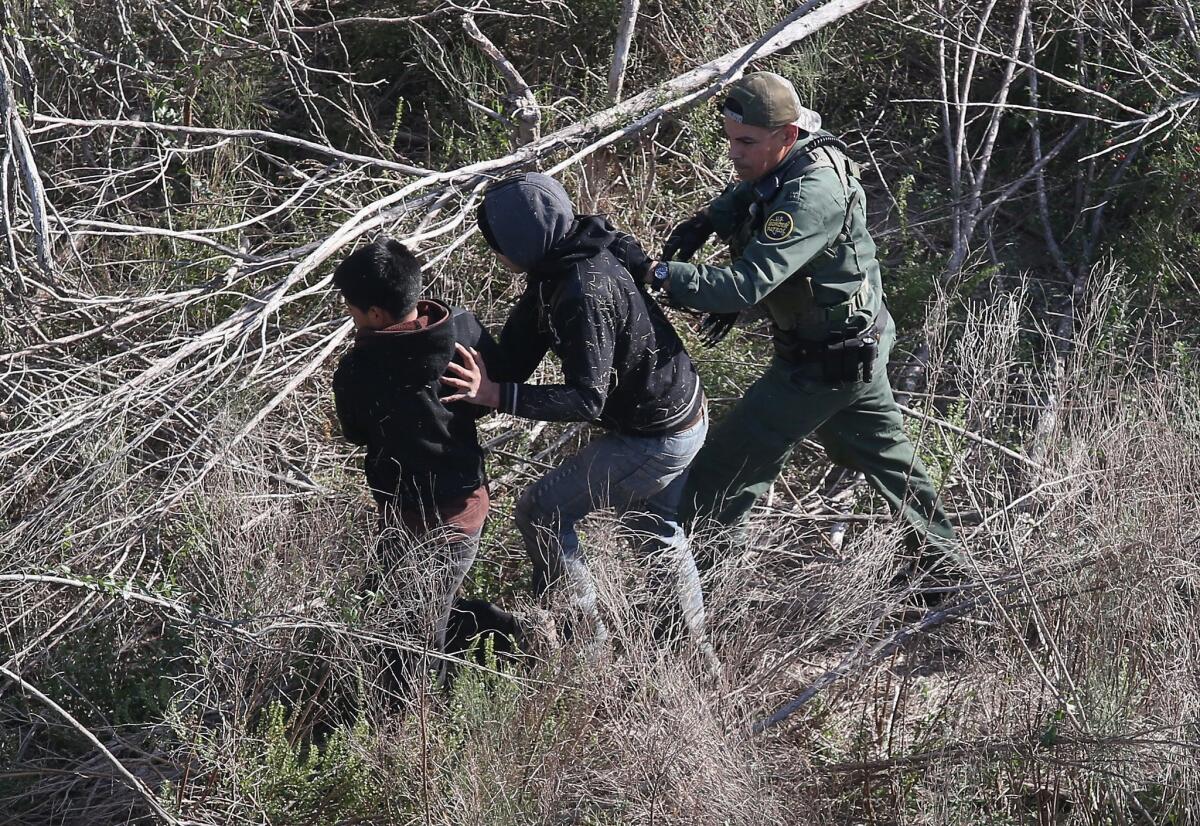Opinion: Amid Central American violence, refugee rights must be respected

- Share via
Add immigration enforcement to the list of jobs the U.S. has partially out-sourced to Mexico, a move that seems to have made life even tougher for unaccompanied minors fleeing violence and gangs in Guatemala, Honduras and El Salvador.
As the U.S. faced a surge of unaccompanied minors crossing the Mexican border over the past couple of years, it developed counter-measures aimed at persuading the Central American kids and their families to stay home rather than gamble with the arduous and dangerous overland route to the U.S. Part of that response was to get the Mexican government to be more diligent at its own southern border and turn back children as they showed up there. That apparently was effective for a time. The Migration Policy Institute reports that:
“While apprehensions at the U.S. border fell, apprehensions in Mexico rose significantly, suggesting that outflows from Central America remained fairly stable throughout 2015; many migrants were apprehended by Mexican authorities before reaching the U.S. border. Indeed, though the combined apprehensions of Honduran, Salvadoran, and Guatemalan nationals by the United States and Mexico fell from 341,000 in FY 2014 to 301,000 in FY 2015, Mexico’s share of apprehensions increased from about 30 percent to 55 percent.”
So while people were still fleeing the Northern Triangle countries at a slightly slower rate (a good backgrounder on why they leave is here), fewer were getting as far as Texas, where most of the U.S. apprehensions occur. But in recent months, border agents have been apprehending more kids than before. For the period between October 2015 and January 2016, apprehensions more than doubled from the prior year and were up 24% over the same period in 2013-2014 (stats going back to 2010 are here). Whether this signals a new surge is unknown, but given the stepped-up enforcement at the Mexico-Guatemala border, clearly the migrants and their smugglers have found new routes north.
And that tightening of Mexico’s southern border has raised serious questions about whether the Mexican government, acting at the behest of the U.S. and helped with U.S. funding, is respecting international safeguards for people seeking asylum from life-threatening conditions in their home countries, according to a new report from Human Rights Watch. Immigrant rights advocates have argued that U.S. policies, including fast-track deportations of minors and mothers with children, are similarly denying them the opportunity to properly made a case that they deserve asylum protections.
According to Human Rights Watch, Mexican authorities routinely detain minors seeking asylum in “prison-like conditions” for months before a hearing is held. “Over 35,000 children were held in immigration detention centers in 2015; more than half of that total were unaccompanied.” Faced with the prospect of lengthy incarceration, many minors give up and return home (to, presumably, try again to get to the U.S.). As several similar reports have noted, those seeking better economic opportunities don’t qualify for protections. But those facing extreme violence and threats of death often do qualify. Yet they are being denied the opportunity to make their case.
In the U.S., the children often have to persuade immigration judges that they qualify for protections. But unless they’re lucky enough to be matched with a pro bono lawyer, they stand alone to make the argument — ignorant of the intricacies of the complicated immigration laws and of what rights and arguments are available to them. The ACLU and other civil liberties and immigrant rights advocates have sued the federal government, arguing that the minors should be provided with a lawyer for such hearings.
Meanwhile, despite a pledge of more U.S. dollars to try to stabilize neighborhoods in the Northern Triangle countries, little has changed, with murder rates leading the world among countries not at war. Extortion and other crimes are rampant as criminals work with relative impunity.
The unaccompanied minors’ issue, which dominated news cycles in 2014 and 2015, has all but disappeared from public discussion, drowned out by the absurdities of the presidential campaign. But it hasn’t gone away.
The U.S. bears responsibility for ensuring that minors who knock at the door and seek protection under both international and U.S. law are treated properly. And if they are being deprived of those rights at the Guatemala-Mexico border as a result of U.S. policy and funding, the government bears some responsibility for that, too.
Follow Scott Martelle on Twitter @smartelle.
A cure for the common opinion
Get thought-provoking perspectives with our weekly newsletter.
You may occasionally receive promotional content from the Los Angeles Times.




